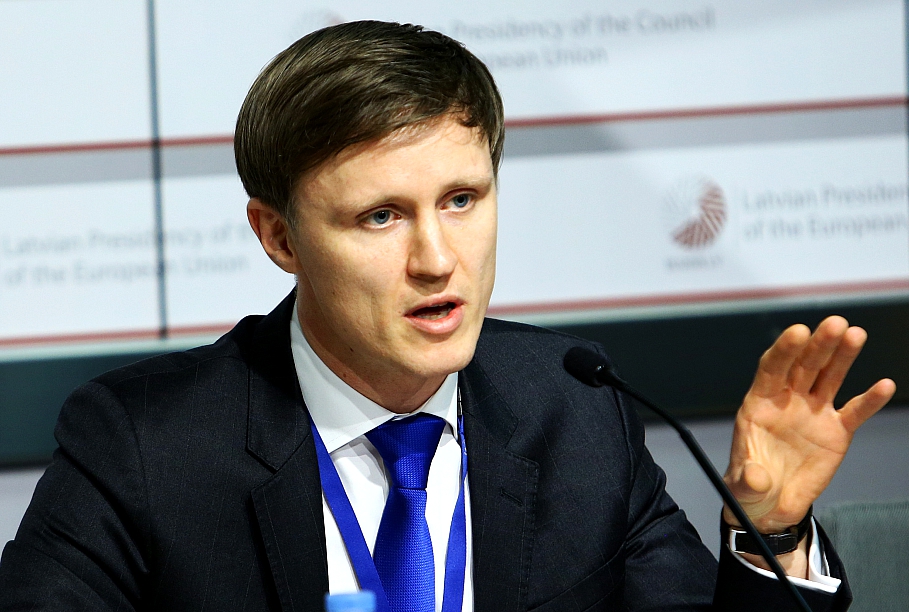Several hundred people gathered outside of the Cabinet of Ministers’ building in Riga on the afternoon of August 4 to take part in a protest against, as stated in the application of the protest, the “forced admission of immigrants in Latvia”.
Several members of the National Alliance (“Nacionālā apvienība”), including myself, attended the protest and, whilst not nearly being the only party who has raised serious concerns and questions about the mishandling of the so-called “refugee question”, National Alliance turned out to be the only ones who are ready to face the public opinion and actually speak with the electorate whose concerns on the decision making process have been loudly voiced since the announcement of this decision.
The coverage of the protest in the national and international media painted an ugly picture – xenophobic slogans, the calls for “saving the white race” were plastered everywhere. And while the participation of such radical groups was, in fact, true and the slogans were not photoshopped in the pictures in any way, the protest was not meant to be about expressing radically nationalist notions as it has been portrayed both in the traditional and social media.
Unfortunately, the true reasons and goals behind the protest have been blurred in the midst of the exceptions in the crowd – those expressing completely unacceptable and downright xenophobic ideas which, as stated by the Security Police, might have actually been provocations.
The protest was open to anyone, and thus provocations are a high possibility. I can only hope that this will be a learning experience for the organisers of the protest in, for example, the necessity to precisely define and reflect the overarching message of the protest in both when inviting people to it and during the protest itself.
From form to substance, the protest is only the latest outcry in what has been an ineffective, disinformative and disregardant communication on the “refugee question” from the decision-making parties. The inability and disinclination to participate in any form of conversation about the issues surrounding the admission of refugees is the exact reason that has sparked the anger of the public. How else can they react, if any question or concern on this issue is met with cries about populism or, even worse, xenophobia?
The National Alliance has previously called to respect the national position in the refugee question that was agreed upon by Saeima’s European Affairs Committee and consider all the factors that could serve as a basis for Latvia’s special position in the process of solving the refugee crisis.
Quite contrary to the principle of separation of power and the common decision-making process in a parliamentary republic, the decision to take in 250 refugees was made in a closed meeting of the Cabinet of Ministers.
This completely disregarded the national position or the fact that these kinds of questions should be put up for a vote in the parliament.
Moreover, the initiative to invite the Prime Minister to explain the various questions that had arisen from this decision was met with swift opposition and was forced out of the agenda by using the age-old tactic of disappearing quorum. The use of these kinds of tactics as a way to prevent a clear and unambiguous discussion and the unreadiness of the “Unity” party to engage in an honest conversation about these issues is a sign of political weakness. No wonder the public is not happy.
Why did I attend the protest? Because someone had to. Someone has to talk to the public and try to explain the the situation that is unravelling before their eyes.
Because we, as a party who have voiced their opinion and concerns multiple times, had an obligation to the public to explain our views – that we are not against working in solidarity towards a solution, we are against the way the process is managed at the moment. The public feels that their opinion is being ignored, therefore someone has to engage in a respectful conversation them even if the leading party refuses to do so. And calling National Alliance’s participation in the protest “voter fishing” is plainly silly – just look at the coverage in the media. This was not a popular decision. But someone had to be there.
An afterthought. Yes, Latvia has to be involved in resolving this humanitarian crisis; there is no question about our need to show solidarity and cooperation with the European Union. However, democratic processes require discussion, involvement and open conversation about unpleasant issues.
The harsh denunciation of anyone who dares to ask questions – be it members of the public or the parliament – is, in fact, what angers everyone the most. The right of opinion and free speech is not reserved only for those who agree with the political majority.
































